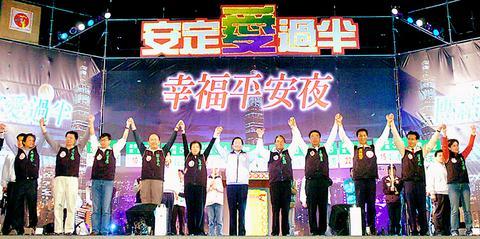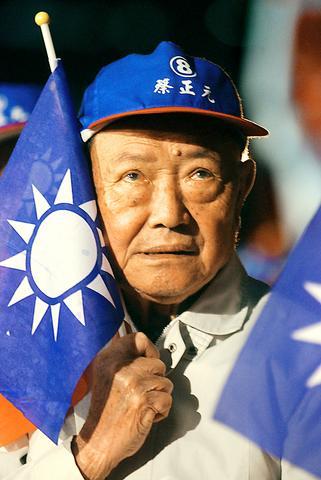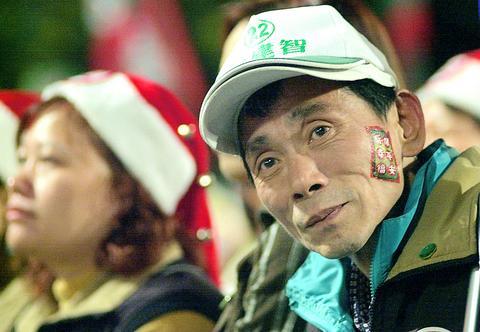On the eve of the nation's sixth legislative elections, and with 225 seats at stake, the four major parties each held rallies in a last-ditch effort to win support and fire up their voters.
Democratic Progressive Party

PHOTO: SEAN CHAO, TAIPEI TIMES
With the legislative campaign entering its final hours, President Chen Shui-bian (陳水扁) yesterday spent a busy day criss-crossing the country to drum up support for Democratic Progressive Party (DPP) candidates.

PHOTO: AP
In the wake of Thursday's events -- a van packed with gasoline cans exploded into a fireball outside the Taipei Railway Station and four suspected bombs were found nearby -- police and other officials in charge of protecting the president yesterday stepped up security measures and heightened their alert wherever Chen appeared.
After stumping in seven locations nationwide during a frenetic last day, Chen reached the end of his long campaign trail last night with a final rally at Taipei City's Shipai Junior High School, in a district that has traditionally been a pan-blue stronghold.

PHOTO: AP
At the rally, Chen highlighted the significance of today's elections, saying they represent a crucial struggle to safeguard the nation's democracy. Chen reaffirmed his determination to push for the passage of 10 major legislative bills if the pan-green camp wins a majority today.
Chen also repeated his pledge to realize "five promises" during the rest of his term in office if the pan-greens win today. The five promises are promoting cross-party cooperation, strengthening partnerships between central and local governments, giving Taiwan a new constitution, streamlining the administration and forming a new Committee for Cross-Strait Peace and Development in an attempt to stabilize the cross-strait situation.
In the wake of Thursday's explosion and bomb threats, Chen told the crowd that "we must condemn and oppose violence."
Saying that the most beautiful thing about Taiwan is that it is a democratic society where everyone is free to express one's thoughts and opinions, Chen said "when one has a different opinion from us, we can debate or argue about it, but we can never resort to the use of violence, force or bombs and hurt innocent people."
With that said, Chen told the crowd that "that's why I am appealing to you ... to give Taiwan a chance for love, a chance for national unity."
Referring to remarks made by Chinese Nationalist Party (KMT) Legislative Speaker Wang Jin-pyng (
"Let's use love and democratic ballots to end the chaos stirred up by the pan-blue camp, to end the absurdity of the party-state phenomenon and to end the Constitution, which is outdated," Chen said to the crowd.
"Let's use love and democratic ballots to rewrite Taiwan's history," he added. "You have given the KMT a chance to dominate the legislature for more than 60 years. I hereby appeal to you to let the pan-green camp have a chance to be a majority in the legislature and carry out work to serve you all."
Other DPP political heavyweights who took the stage to stump for the legislative hopefuls last night included Vice President Annette Lu (
Reporting by Huang Tai-lin
Chinese Nationalist Party
An estimated 10,000 supporters gathered at the Chinese Nationalist Party's (KMT) and New Party's election-eve rally last night, cheering as pan-blue heavyweights called on voters to mobilize family and friends to hit the polls today in the last hours before the elections in order to save Taiwan's economy, stabilize cross-strait relations, and balance the government.
At the rally, held in the parking lot of a department store near Taipei's City Hall, pan-blue heavyweights such as New Party Chairman Yok Mu-ming (郁慕明), Legislative Speaker Wang Jin-pyng (王金平), and Taipei Mayor Ma Ying-jeou (馬英九) made repeated reminders to voters on voting regulations and called for a pan-blue majority yesterday.
President Chen Shui-bian (
Speaking at the rally, KMT Chairman Lien Chan (連戰) suggested that Chen had changed the focus of this year's election to vague issues such as Taiwan's national title and status, a new constitution, and the national symbol to draw voters' attention from his administration's lackluster performance in the past four years.
Furthermore, Lien said, Chen did not have the dignity needed to be president, given that most of his campaign issues regarding Taiwan's independence are simply following the tune of the Taiwan Solidarity Union (TSU). The pan-blue camp stands for peace by negotiating with China within the boundaries of the status quo, Lien said.
He also criticized the president for creating what he called societal division.
Today will show the world the new will of the people, said Lien yesterday, repeating his call for a new Cabinet should the pan-blue camp win a majority in the legislature today.
Deputy Legislative Speaker Chiang Pin-kun (
The appointment of the premier is, however, determined by the president, not the legislature.
Chiang, who, nevertheless, stood on stage to calls of "Premier Chiang," called on voters to show their support for the Republic of China -- as Taiwan is officially called -- by voting for pan-blue candidates today.
Speaking in response to recent comments by Chen Shui-bian that he would not consider Chiang as premier since the DPP has enough political talent besides Premier Yu Shyi-kun, Chiang said that the DPP does not have the ability to solve the nation's problems.
"Does the DPP have talent? They do -- they have `election' talent. The DPP makes politics its first priority: it puts itself first," Chiang said yesterday.
In contrast, Chiang said, the pan-blue alliance will make Taiwan's economy its number one priority on behalf of the people.
KMT and New Party candidates running in Taipei City and County also took to the stage yesterday, with party candidates from each district appearing together to make their appeals. While at the rally, candidates called on supporters to support all pan-blue candidates, the arrangement highlighted recent conflicts between party candidates this election cycle in the face of the party's vote allocation plans.
An example was Legislator Apollo Chen (陳學聖), a KMT candidate running in Taipei's south constituency, who has been reported to be in conflict with fellow party candidate Pan Wei-kang (潘維剛).
Pan accused Apollo Chen yesterday morning of telling party organizers to canvass for him instead of her in district neighborhoods the party had originally designated as her voter canvassing areas.
At the rally, Apollo Chen said he was willing to use his two minutes of fame there to support his fellow candidates, since the important thing was a pan-blue majority in the legislature.
In contrast, Pan burst into tears when she appeared onstage, telling supporters to support only those candidates who were willing to "follow the rules."
In a forewarning of the support the pan-blue camp may find among future independent legislators, the rally also featured independent Legislator Sisy Chen (
Reporting by Caroline Hong
People First Party
People First Party (PFP) Chairman James Soong (
The party held its last major campaign activity in Kaohsiung City last night, and Soong helped promote the two Kaohsiung City candidates -- Chiu Yi (邱毅) and Chang Hsien-yao (張顯耀).
During the campaign activity, Chiu's wife fainted on stage due to over-excitement while complaining about Chiu's indictment for leading pan-blue protesters in surrounding the Kaohsiung District Prosecutors Office after the March presidential election. She was then rushed to the hospital.
Soong, meanwhile, rebutted Chen's accusation two days ago that he was an accomplice in the Kaohsiung Incident.
"Chen Shui-bian questioned where I was during the Kaohsiung Incident 25 years ago, and now I have to ask him back: where was he when the veterans were fighting to protect Taiwan in Kinmen and Matsu 30 years ago?" Soong said.
"If the one who was jailed the longest in the Kaohsiung Incident could become president, then it should have been [former Democratic Progressive Party chairman] Shih Ming-teh (施明德)," he said.
Soong also said that the past should be not appropriated for one's own political advantage.
"History is a mirror, and we should be forgiving and tolerant of the past instead of appropriating history to obtain power and divide different ethnic groups," Soong said.
"We should also not use history to sling mud at others and provoke hatred," he added.
Soong also urged the voters to vote for the PFP on the grounds that the party will advance cross-strait peace.
"The PFP is offering the public a vision for a pluralistic society, a caring government, and cross-strait peace instead of an arms race [with China]," the PFP chairman said.
"The US has already warned Chen against engaging in pro-independence moves, otherwise there would be war. US President [George W.] Bush also said that for Taiwan to go into war with China would be like a war between a mosquito and an elephant," he said.
"The PFP is the only party that proposes a cross-strait peace bill, and to propel the principle of `no Taiwan independence, and no China invasion.' Taiwan doesn't want war ... we want peace," Soong said.
Reporting by Debbie Wu
Taiwan Solidarity Union
Former president Lee Teng-hui (李登輝) yesterday said the Taiwan Solidarity Union (TSU) was the most important local force for combating China's hegemony and threats, asking voters to support the TSU and help it to win at least 25 seats in today's legislative elections.
"We cannot succumb to China's military threats nor fear to say out loud that our country's name is Taiwan," Lee said.
"However, Lien Chan and James Soong are much, much worse than China. The pan-blue camp they have led has inflicted unending disorder upon Taiwan's society and its politics. If we don't win, it will result in continued disturbances."
"The TSU has insisted that it will guard Taiwan and stand firm on Taiwan's position," the party's spiritual leader said. "The TSU cannot wait any longer. Local politics must grow up."
Lee made the remarks last night at the TSU's campaign rally at Erchong Waterfront Park in Taipei County. Despite chilly winds, the TSU rally, entitled "Save the TSU, Guard Taiwan," attracted around 20,000 supporters. However, owing to rushed preparations, no chairs were available so supporters simply sat on the ground.
All TSU candidates in the nation's northern electorates attended the rally in a final push for votes. A number of pro-independence advocates also spoke at the rally.
Lee's wife, Tseng Wen-hui (曾文惠), and daughter Annie Lee (李安妮) also made appearances during the rally.
Annie Lee said the reason the TSU was established three years ago was because the DPP had made the "four noes" commitment to the US after President Chen Shui-bian's assumption of office in 2000.
"We cannot trust the DPP, which only makes commitments but fails to realize them," she said, adding that Chen's "four noes" pledge had made Taiwanese feel "depressed."
"Why does 83-year-old Lee Teng-hui still work so hard for the country? Because he still bears the cross of the country's future and because our goal of making a new constitution and changing our country' s name hasn't been reached," Annie Lee said.
"All women should walk out of the kitchen and support the TSU, contribute your labor and play a role that stabilizes the country," she said. "I believe the TSU will build up a country which is civil, progressive, great and content," she said.
Earlier in the day, Lee Teng-hui campaigned for David Huang (黃適卓), who is running for the party in the keenly fought southern constituency of Taipei City.
Responding to a DPP poll predicting the TSU would only snare 16 to 18 seats, he offered a different interpretation.
"In terms of the effort that the TSU has put into this election, I think we can grab at least 25 seats," Lee Teng-hui said.
"The DPP's prediction was not only incorrect but also childish," he added, pointing out that if the TSU did not increase its share of seats then the pan-greens would not easily win victory.
"The DPP's candidates can't expect victory by taking all the ballots -- this is not practical," Lee Teng-hui said. "The DPP should encourage the TSU to get more votes, instead of attacking the TSU, so that the pan-green camp has the chance to win a legislative majority."
He added that a vote-allocation plan he proposed for Hsinchu City and Kaohsiung City in which the husband votes for the DPP and his wife votes for the TSU was realistic and could produce a win-win situation for both parties.
Reporting by Jewel Huang

AIR SUPPORT: The Ministry of National Defense thanked the US for the delivery, adding that it was an indicator of the White House’s commitment to the Taiwan Relations Act Deputy Minister of National Defense Po Horng-huei (柏鴻輝) and Representative to the US Alexander Yui on Friday attended a delivery ceremony for the first of Taiwan’s long-awaited 66 F-16C/D Block 70 jets at a Lockheed Martin Corp factory in Greenville, South Carolina. “We are so proud to be the global home of the F-16 and to support Taiwan’s air defense capabilities,” US Representative William Timmons wrote on X, alongside a photograph of Taiwanese and US officials at the event. The F-16C/D Block 70 jets Taiwan ordered have the same capabilities as aircraft that had been upgraded to F-16Vs. The batch of Lockheed Martin

GRIDLOCK: The National Fire Agency’s Special Search and Rescue team is on standby to travel to the countries to help out with the rescue effort A powerful earthquake rocked Myanmar and neighboring Thailand yesterday, killing at least three people in Bangkok and burying dozens when a high-rise building under construction collapsed. Footage shared on social media from Myanmar’s second-largest city showed widespread destruction, raising fears that many were trapped under the rubble or killed. The magnitude 7.7 earthquake, with an epicenter near Mandalay in Myanmar, struck at midday and was followed by a strong magnitude 6.4 aftershock. The extent of death, injury and destruction — especially in Myanmar, which is embroiled in a civil war and where information is tightly controlled at the best of times —

China's military today said it began joint army, navy and rocket force exercises around Taiwan to "serve as a stern warning and powerful deterrent against Taiwanese independence," calling President William Lai (賴清德) a "parasite." The exercises come after Lai called Beijing a "foreign hostile force" last month. More than 10 Chinese military ships approached close to Taiwan's 24 nautical mile (44.4km) contiguous zone this morning and Taiwan sent its own warships to respond, two senior Taiwanese officials said. Taiwan has not yet detected any live fire by the Chinese military so far, one of the officials said. The drills took place after US Secretary

THUGGISH BEHAVIOR: Encouraging people to report independence supporters is another intimidation tactic that threatens cross-strait peace, the state department said China setting up an online system for reporting “Taiwanese independence” advocates is an “irresponsible and reprehensible” act, a US government spokesperson said on Friday. “China’s call for private individuals to report on alleged ‘persecution or suppression’ by supposed ‘Taiwan independence henchmen and accomplices’ is irresponsible and reprehensible,” an unnamed US Department of State spokesperson told the Central News Agency in an e-mail. The move is part of Beijing’s “intimidation campaign” against Taiwan and its supporters, and is “threatening free speech around the world, destabilizing the Indo-Pacific region, and deliberately eroding the cross-strait status quo,” the spokesperson said. The Chinese Communist Party’s “threats